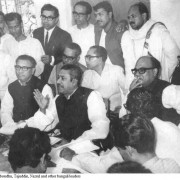The day Bangabandhu came home
THE crowds began converging in front of Tejgaon airport at dawn. By early morning, the place was dense with people — young and middle aged, with a smattering of the aged — come to welcome the founding father of the new state of Bangladesh, back home from ten months of captivity in Pakistan. It was January10, 1972. Bangabandhu Sheikh Mujibur Rahman was flying home from London, whence he had been flown by the Pakistan authorities a couple of days earlier.
The whole of Bangladesh was in celebratory mode on the day, indeed had been since news had first come in of Bangabandhu’s arrival at London’s Heathrow airport from Rawalpindi. On January 8, though, when Bengalis first heard of their leader’s departure from Pakistan, a certain kind of panic and a sense of apprehension set in about his safety. That was again natural, for ever since his arrest by the Pakistan army in the early hours of March 26, 1971, he had not been seen in public.
He had been flown to the then West Pakistan and placed in solitary confinement in Lyallpur jail. In Bangladesh, the genocide organised by the military regime of Yahya Khan was well underway, thanks to the ruthless Tikka Khan. In the nine months between March and December of the year, 3,000,000 Bengalis were murdered and 200,000 Bengali women were raped by the soldiers of the Pakistan army.
No one in occupied Bangladesh knew if Mujib was dead or alive. The first indication that he had not been put to death came on August 9, when state-owned Radio Pakistan put it about that the Bengali leader would be placed on trial on August 11 on charges of treason before a military tribunal whose proceedings would be conducted in camera. The eminent Pakistani lawyer A.K. Brohi, it was revealed, would be Mujib’ defence counsel. In the subsequent weeks, Yahya Khan made quite a few references, all derogatory, to Bangabandhu in the course of some media interviews.
By late November, as was to be known later, the tribunal had found Bangabandhu guilty of treason, with the very likely possibility of the judgement soon leading to his execution. But then came the Indian entry into the war between Bengalis and Pakistanis on December 3, prompted by Pakistani air force jets striking Indian cities on the border with West Pakistan. By December 16, all was over for Pakistan, as Bangladesh stood liberated through the surrender of 93,000 Pakistani soldiers.
Zulfikar Ali Bhutto, who took over as Pakistan’s new president from Yahya Khan on December 20, ordered the placing of Bangabandhu, who had triumphed over him at the general elections of a year earlier, under house arrest on December 22. On December 27, Bhutto turned up at the rest house where Mujib had been placed on his orders. It was the first meeting between the two men after the abortive political negotiations in Dhaka in March.
Bhutto’s goal was clearly to extract promises from Bangladesh’s leader about some form of links between Pakistan and its now free eastern province. Mujib did not oblige him.
On January 3, 1972, addressing a public rally in Karachi, Bhutto rhetorically asked his audience if they would permit him to free Mujib. The crowd roared its approval. As the night deepened on January 8, Bhutto accompanied Bangabandhu Sheikh Mujibur Rahman to Rawalpindi’s Chaklala airport. Mujib was being freed, along with his constitutional adviser Kamal Hossain and family (Hossain had been arrested in early April 1971 and placed under detention in West Pakistan). Senior officers of the Pakistan military accompanied Bangladesh’s founder on the special PIA flight taking him to London.
Bangabandhu was received at Heathrow by officials of the British Foreign Office as well as the senior-most Bengali diplomat of the time, M.M. Rezaul Karim, and other members of the Bangladesh mission in London. Soon after his arrival, he called on British Prime Minister Edward Heath and opposition leader Harold Wilson. He called his family in Dhaka and also spoke to Prime Minister Tajuddin Ahmed on the phone. Indian Prime Minister Indira Gandhi called him and greeted him on his release from imprisonment. In the evening of January 8, Bangabandhu addressed a packed news conference at Claridge’s hotel and paid tributes to his nation on attaining victory in an “epic war of liberation.”
Bangladesh’s president, for that was the position Bangabandhu occupied as a result of a decision by the provisional government at Mujibnagar on April 17, 1971, left London late the next day on a special aircraft put at his disposal by the British government. The next morning, January10, he broke journey in New Delhi, where he was warmly welcomed by President V.V. Giri, Prime Minister Indira Gandhi, members of the Indian cabinet, and civil and military officials. He addressed a public rally thanking Indians for their support to Bangladesh’s liberation struggle. And then he took off, this time for home.
He arrived in Dhaka at 1.40 in the afternoon to a rapturous welcome from his people. The truck carrying him, in the company of Bangladesh’s government leaders, to the Race Course took nearly three hours to reach its destination. At the Race Course, Bangabandhu broke down in tears as he paid tribute to the millions who had sacrificed their lives for freedom.
He was happy his Golden Bengal was finally free, happy that Bengalis had emerged free of Pakistan. It was twilight when he and the million strong crowd made their way home after what been a dramatic day.
Source : The Daily Star








